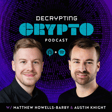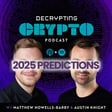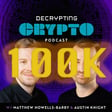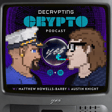Become a Creator today!Start creating today - Share your story with the world!
Start for free
00:00:00
00:00:01

On Chain Gaming's Struggle to Find Product Market Fit
In this week's episode, we discuss:
1. Quick overview of the current macro situation.
2. Crypto gaming's struggle to find PMF and what's next.
3. Lessons learned from minting Runes.
Transcript
Introduction
00:00:00
Speaker
are are a are
00:00:11
Speaker
Hello and welcome to the Decrypting Crypto Podcast. It's June 6th, 2024, and this is Off Chain. Your weekly recap of the biggest stories in the crypto space. I am Matthew Housebarbie, and as always, I'm here with my trusty co-host, Austin Knight. How you doing, Austin? Oh.
00:00:35
Speaker
Full HD. Welcome to the future. Welcome to the future.
Bitcoin ETFs and Market Optimism
00:00:41
Speaker
Uh, yeah, it's been, um, it's been an interesting few days of inflows into the Bitcoin ETS. I'm not sure if you saw this. I think that not yesterday, today the day before. So Tuesday we had like the second highest inflows on a daily basis into BTC, which. I don't know. It's just kind of come out of nowhere, really. I know that things are looking mildly optimistic from a, well, slightly more optimistic from a Fed rate cutting perspective. Canada cut their rate and they're probably the first major central bank to do it. We got the jobs report tomorrow and people seem to think that that's going to be coming in looking good because unemployment was you know ah in in line with forecasts.
00:01:32
Speaker
Yeah, things are, things are shaping up. Things are shaping up.
00:01:51
Speaker
Yeah. I hear people need those.
00:02:20
Speaker
Yeah, that's a lot.
00:02:30
Speaker
yeah that's a lot
00:02:45
Speaker
No.
00:03:07
Speaker
Yeah.
US vs UK Housing Markets
00:03:28
Speaker
It's interesting, I think a lot about the um the housing market in in the US versus versus Europe and in particular the UK and the differences that that we have. Not as much as as I showed last week, I think about orange juice futures, but I i do think about it a lot. ah But you know it's interesting because in there's some real structural differences that I think create this very detrimental lag in housing market corrections in the US that we don't observe in the UK. And I think this was also a huge contributing factor to ah the housing and financial crisis right of like the subprime days. But in the US, and and actually a lot of people in the US when I speak to them about this don't realize this, but
00:04:18
Speaker
In the US, it's very common right to take on a fixed rate 30-year mortgage where you're're you're locking a rate for 30 years. That instrument does not exist in the UK. It does not exist in most of Europe. In fact, the longest fixed rate mortgage that you will get is pretty much five years. You'll have a five-year fixed rate. After that, you'll move to a variable rate or you just you know renegotiate another either two, three or five year fixed rate. Probably the most common fixed rate term that you'll take on like a 25 or 40 year mortgage is
00:04:53
Speaker
two or three years. so So what does that mean, right? What that means is when you get into these high inflationary, high rate environments that then have a knock on effect into the mortgage rate and mortgage rate spike up to like what you have in the US, right? Seven, seven and a half percent kind of levels, which is obscene.
US Housing Market Challenges
00:05:14
Speaker
In the UK, that causes like real challenges yeah in um in a much shorter timeframe, right because people's fixed rate turnover, that like they turn over and as a result, you have to move to this new rate. You're not locked into your previous 2% or 3% rate.
00:05:33
Speaker
or lower depending when you took that out. So what you start to see is if people cannot afford their current mortgage, they have to downscale, right? And then their house has to be sold. And then you often see houses being sold at a discount because the premium of the leverage that you're taking out in the mortgage is kind of extracted from the house price. So we see this much more quicker um realization of property price reduction that happens because people move into the realities of this new rate.
00:06:09
Speaker
what you see in the US, which is so much is is very beneficial to existing homeowners, but incredibly difficult for new buyers. You see people locked into a 3%, 4% rate right that they have for a 30-year period. So for all intents and purposes, they don't really need to worry too much about this 7% rate that that people are locking in right now on new purchases. New buyers, wow, they are just really suffering and being able to take on a rate like this. House prices, though, have not really budged because of the fact that there aren't the same level of forced buyers that are driving down the market.
00:06:52
Speaker
And then on top of that, you get the double whammy of the rental market seeing huge inflation because people are rising up rents with goods inflation because the cost of living is good. So it's just, if you are a non-home owner trying to buy a house right now and you live in the US, in particular in areas like Austin, it is quite literally the worst time in generations to ever be in that position.
00:07:29
Speaker
Right.
00:07:40
Speaker
Love it. Yeah.
00:08:07
Speaker
Yeah.
European Housing Shortages
00:08:22
Speaker
Oh yeah. ah
00:08:39
Speaker
Well, this is the other piece. we We just have shortage. It's a housing shortage crisis perpetually across Europe. In the UK, we do not build houses. I lived in ah in in Dublin for for several years, um a few years back. and that is even worse. They will literally build on an annual basis net new housing in the hundreds for the entire country. It's unbelievable. And the UK is also in a proportionally similar state, and that again is very challenging. But when you also see property price depreciation in such a constricted supply, things are bad. Things are real bad.
00:10:00
Speaker
i saw a beautiful I saw a beautiful shed ah going for for that in London, actually. yeah ah
00:10:51
Speaker
wow
00:11:32
Speaker
Yeah. archaic Archaic property and and construction like regulations. And and and and it it is, it's the bane of of a lot of the UK, especially outside of London as well, actually, um in in a lot of, like I guess, what you would class like the British countryside. It's very, very difficult to to build. um Anyway, that ah concludes our just about to say. This concludes our real estate episode.
Crypto Gaming Space Analysis
00:12:06
Speaker
um why don't we ah why don't we Why don't we jump into the main meat where we actually talk about crypto. ah
00:12:24
Speaker
I want to take a little segue here into the world of on-chain gaming. um Many of you may may know that I spent a good couple of years full-time working in ah crypto gaming in ah in a game studio there and have a lot of experience just of of that space as a whole. And the reason why I want to dig into this because I think, Austin, that gaming in crypto is in a precarious state right now. and there are a few There are a few current controversial topics right now, areas of discussion that are happening across the crypto space. And one of those that relate to gaming that is, one of those is with Arbitrum and their DAO. The DAO has a treasury that is currently worth a little shy of $4 billion, dollars which is phenomenal um right now. And the
00:13:20
Speaker
you know I could probably talk about the the proposals that they're they're sharing out right now, which seems to be an obsession with trying to spend as much of this treasury as humanly possible. But um one of the areas that's definitely sparked a lot of ah discussion, somewhat controversy, is their decision to launch a roughly $250 million dollars ecosystem fund specifically to support gaming projects building on their their chain. now ah This comes in the form of 225 million ARP tokens, which are worth around about 250 million right now. um you know they This is a big chunk of change to spend on a vertical which
00:13:58
Speaker
While Arbitrum have categorically doubled down on on this for a few years now, um and I think they've had ah relative success ah like compared to other areas of crypto in getting games and ecosystems of gamers to to come into there, I think Treasure and that whole ecosystem is has done a good job. At the same time, this whole vertical is still really struggling to find product market fit. And this brings up a bigger question here um about gaming in crypto as a whole.
00:14:34
Speaker
This has been a vertical that has received an enormous amount of funding. One of the like highest funded verticals across the past five to six years in crypto, probably the the highest. um but It's yet to see really a breakout app that that's came from all of this. There's been funding in the gaming vertical since, you know, I mean, when we when we were first launching this podcast in 2017, there was gaming studios and at least the gaming infrastructure being funded that's now turned into, you know, the immutables of of the world, et cetera. And it was so exciting to see how much potential
00:15:17
Speaker
there was and in the space at that time. 100, there's loads of excitement, and it made sense. And it does still, I will say in all this, it still does make sense. The problem I have is that um is this is the way in which we're thinking about gaming and crypto the right way right now, and are we investing in the right projects and the right projects in the right ah mission? So i want I want to put some perspective into this. In 2022, there was $10.7 billion dollars in funding, private funding for Web3 gaming projects in just 2022. That's an enormous amount of of ah venture capital that's gone into that.
00:15:59
Speaker
And back in 2022, in Q1, if you want to make an argument that's bullish for for gaming, Play to Earn Games, they accounted for just under 50% of all blockchain activity in Q1 2022. I think the reality here which I'll come on to to make my point is that I think most of these were just a wrapper for yield farming, and the majority of that would probably axi infinity step in and a few others. And if we take stepping as an example, because I think I'd love to do a comparison here just a really quick one right that's like,
00:16:35
Speaker
of one of the more consumer-friendly game verticals, which is fitness. You can see the gap compared to games that are outside of crypto. If we take Steppen, and I think maybe we could have took Sweat Protocol as well as an example, so similar at its peak around this, May 2024, Steppen was like, it it has been one of the biggest, most hyped kind of fitness projects. It's effectively you know Strava on the blockchain. In May, did 31,000 monthly active users. And its absolute peak in May, 2022, did 700,000 monthly active users. And I think Sweat Protocol is similar, right? Strava, as you probably know, the popular like running app, basically the off-chain version of Steppen, is bringing in over 2 million new users each month.
00:17:31
Speaker
on its own. but like Forget their monthly active users. That's just net new user growth on a monthly basis. Unreal. Yeah, with it's 120 million active users through last year. and That's not monthly active users, but all right, let's extrapolate it, give a bearish take of that of like 40 million of the active users maybe. um The gap is enormous, not even close, right? And um okay, you know, Strapa's been around a bit longer, a few more years, but it's still so, so far away. And
00:18:08
Speaker
You know, I want to say I believe that the gaming space in crypto for on-chain games has huge potential. As I said, I spent the best part of two years working in this space. I wouldn't have done it for no reason. But there is a mismatch between what gamers want and what gamers are being offered today. Gaming, for many people, I would argue the majority of like real like hardcore gamers is this is an escape. It's an escape from reality. It's a safe space. It's away from the worries of the real world.
Gaming Financialization Critique
00:18:43
Speaker
right And I think it's the closest thing we've achieved to kind of like the metaverse so far. Financializing this experience
00:18:52
Speaker
can just break down the walls of like this reality that we're creating and just bring the very troubles that you've kind of sought to escape into the forefront of this experience. That is no longer an escape. yeah and you know and and and And I think there this is why I believe there is a general aversion to crypto from the gaming community. the If you go to any gaming subreddit, right you talk about crypto, you will get destroyed. They hate it. And believe me, i I found this from working in the the the crypto gaming space. so
00:19:29
Speaker
they don't want real world consequences for the in-game actions, let alone like financial ones. And it's this reason why I actually think the only area so far of crypto gaming to find product market fit is GambleFi, right? Whether that's prediction markets, casino gaming, the users of these dApps, are explicitly there for financialized gaming. um And that's great, right? Doing this on-chain is, in my opinion, better. It increases transparency. It offers experiences that aren't actually possible in off-chain betting, prediction markets, casino. And this has been shown. You see, um we were talking
00:20:16
Speaker
when was this, like a couple of episodes, a couple of weeks ago, Austin about poly markets, like betting on the ah Biden Trump election, they they just got 70 million in a funding round. And it's a great example of this. it's It has got product market fit. And it's it's no coincidence that many of the most popular dApps in, you know, flavor of the month blast ecosystem are in gamble fi as well. And I think ultimately, this kind of sector of gaming, if we can make an argument of whether we even call it that, is more similar to like mean coin trading in the it than it is to actually gaming as a whole, at least from just an audience fit and an intention perspective. So I just, I struggle now with like us trying to fit this financialization push into
00:21:14
Speaker
into gaming because the value proposition of bringing gaming on chain, and this is what got me really excited about about gaming on chain, is and it's about portability. It's about composability. This is ah this is like a superpower, right? we have We haven't even scratched the surface of what's actually possible with it. There's been lots of projects that have actually tried here and I think they've over-financialized their ecosystem and it's kind of just dragged it down. you know The game development process in crypto is fascinating. It's turned
00:21:50
Speaker
the kind of traditional gaming development process inside out. yeah you It can actually be the opposite, right? So you can start with a simple in-game asset. You can build characters and items without and anything surrounding it and allow players and other creators to build a universe around them. Let's look at stuff like um Minecraft Roblox. They're good examples of this, right? That have just built a free-flowing universe, a metaverse, right? that people can create within. You can do this, but without having the walled gardens of these centralized universes, you can take your items, your characters from this universe and bring them into another universe that someone else has built. They're completely composable, they're portable. And I think you know this is what innovation looks like for me. The sooner we ditch
00:22:44
Speaker
our obsession with financializing games. I think the sooner we'll actually win over the the the gamer crowd. um And I will get off my soapbox now. But I just think I feel really strong about this because I see so much potential in in this space. And it's really challenging um yeah to to break through it. Yeah. What do you think of you know models like what has happened with Fortnite, for example, where I think that the like the central value prop of the game is not about the monetized aspect of it, but the deeper that gamers engage with it, the more inclined they are to monetize. and I mean, the monetization of that game has been quite remarkable, among others, some of which you've already mentioned.
00:23:29
Speaker
um That feels like financial ization to me so is your is your point that. Financial ization shouldn't be like the core focus or or value that a that a game delivers um or is it that the financial ization actually can kind of corrupt the game itself. I, so I think both of those, here's my, the thing that phil fills with like, just despair when I, when I was, especially when I was in the gaming space was Fortnite was the classic example that is still used as like the rationalization for the financialization of crypto gaming, right? The, it goes like this, as you say.
00:24:13
Speaker
People are willing to spend hundreds, sometimes thousands of dollars on in-game assets, skins, stuff like that for within Fortnite. But you don't own them. You can't take them anywhere. Crypto solves this. I agree. The problem is, instead of saying, Why do they do they spend? The reason why they spend is because Fortnite has built an incredible universe, right? A social network, a game, an experience, an escape that is
00:24:51
Speaker
It truly is like connected with people on whole different levels to to the point where you know people escape into this world and they connect with it. And they want to enhance that experience now that they're in there and they've experienced this so much. And they say, hey, I want to I want to create my own identity in here. I want to stand out in this world, this new area that I'm in, and you know I want to buy some additional skins and some other assets. right What they're not saying is, I would like to make an investment in this asset to flip it and financialize it. I love this space, and just like I love going out to a nice restaurant and when I go to that nice restaurant i might night I might buy myself a lovely shirt to wear at that restaurant because I love it and it's an experience and that is part of my experience.
00:25:43
Speaker
Instead with crypto gaming, we've said, hey, I know why, because people love buying stuff and thinking about trading it. It's like, no, that can exist. There is a place for that. But that is not why people are buying skins inside Fortnite. Otherwise, why the hell would you do it? It's a terrible investment because it's locked in the Fortnite ecosystem. It's because that they feel part of like a tribe, a community. and I think you cannot begin with the monetization of something before building the community. And then the problem, to and I think an important thing that you said in the last piece is that, is it because the financialization corrupts things? And that is the death blow, actually, to the ah um to to many, many crypto games. There have been quite a few crypto games that are categorically good games.
00:26:33
Speaker
and they had potential to get somewhere, right? I actually think Steppen is a good example of this. ah it was It was good. It was a good running app. It was kind of like Strava. they you know They could have built something here. They they built a community. the financialization killed it because you have this extreme inflation of in-game asset prices, which raises the bar to ever be able to participate as an individual. And then it turns into a financial decision versus an entertainment, a leisure, a community and experience decision.
00:27:09
Speaker
first. And that is really challenging. And then you have a whole different dynamic where as a game developer and a steward of an ecosystem, you have to make decisions that prioritize the financial model of the ecosystem versus the experience of your users, which is the antithesis of what the whole value prop of crypto on game jay on-chain gaming is all about. And and that is where you know great ideas go to die. Yeah, it's so true. And you you also see these issues happen in traditional gaming as well, right? I think there there's been a lot of blowback against like,
00:27:51
Speaker
downloadable content and you know famously Grand Theft Auto, what is it like 13 or 14 years old now? i think I think I'll be retired by the time Grand Theft Auto 7 comes out. Yeah, that way I can actually play it. um So I have one other thing. You talked a lot about GambleFi.
GambleFi's Potential and Challenges
00:28:11
Speaker
Um, I remember a couple of years ago, a good friend of mine reached out to me and he was like, Hey, what is like web three and the metaverse? And jokingly I replied degenerate gambling.
00:28:23
Speaker
yeah And he was like, as soon as I said that, he was like, now I get it. And this is awesome. Like, it's gonna work. If you throw gambling into something, it's gonna grow, it's gonna generate revenue, right? That's great. um and And it does feel to me like, you know, nascent internet, there's a parallel here and everything like that. And then of course, eventually it got banned, or at least in the US. um I see the value in it. I also feel like it just is bad for crypto's brand. i mean We already have this sleazy reputation of like there's all these scams and things like that, and then you layer
00:28:59
Speaker
that like ga gambling on top of it. um What do you think is the role ah like in the grand scheme of things for gamble fight, not just in like crypto based gaming, but really in the crypto space as a whole? Like, is this something that that temporarily plays an important role and then eventually fades? more into the background as we kind of saw with the the evolution of the web. Or you know do you think that this is actually something interesting as like a central use case for crypto and and crypto gaming in the long term? I think that it is going to be and will be an ever-expanding
00:29:41
Speaker
vertical that has very clear product market fit and can provide real value compared to the off-chain alternatives in particular around prediction markets. And here's why. So I agree with you. um Do we want like the, just, you know, this to be what cryptos use cases? No. Um, is it a great use case that can provide better outcomes for individuals that want to participate in, you know, gambling prediction markets versus the current options out there? Yes. With a giant asterisk. Here's the deal. You want to do bedding? You want to do prediction markets? You want to do gambling?
00:30:27
Speaker
you need to abide by regulation. and this is and And also, you need to do this responsibly. You need to have proper disclaimers, education for for for your users. This crypto is not the workaround to just do unregulated gambling. That is not a good value prop here. However, regulated, responsibly built prediction markets where users know what they're getting signing up for right can come with new levels of transparency. ah you know The UK and Europe, um we are
00:31:05
Speaker
a gambling nation, in particular with sports betting prediction markets, right. And to say that those ah sports books prediction markets are opaque would be an understatement. There is no clarity on you know, the the spread that the bookmakers are taking, whether they're betting against you, what is determining like real time odds and and otherwise, when this data is all on chain, that is really valuable transparency. And when the incentive for the protocols that are building these are not to generate a profit against those participating in the prediction markets, then there's real value there. um And I think there can be real positives. you know I'm not a proponent of of gambling. um so but But speaking objectively and looking at this, I think there are real valuable use cases in that space.
00:32:00
Speaker
Is the lion's share of it right now degenerate gambling? Of course it is. right ah it is it Is it better than meme coin trading? Probably. um you know it's ah so so i think you know this is I do think that for where these applications protocols are being compliant and can offer real value. And it, you know, it also makes for like, you could do like really interesting composable derivatives that are just not possible in, in offline. I think there's going to be a lot of innovation in prediction markets actually.
00:32:39
Speaker
um But yeah, I i do think there's a place ah for it. um But like with anything, you know it needs to and needs to be managed accordingly and transparently. Yeah, I agree. I also think it's an interesting distinction that you're drawing here, which is like, along the gradient of gambling, closer to prediction markets, further away from slot machines. Yeah. Uh, 100%. Yeah. Like just moving into like non skill-based pure luck stuff. Like, uh, you know, on-chain poker and skill-based games. Yeah, for sure. Uh, again, much more transparent than what you'll get from going to,
00:33:28
Speaker
ah online poker where everyone's using like ah overlays and a bunch of other stuff that's just gaming the system and bots and stuff like that, real value in in that being on chain. um Slot machines, you know you know spinning a roulette wheel, probably not. um yeah That said, it's it is still better than off-chain for sure. All right, let's ah let's jump into our our last story of the day.
00:34:01
Speaker
Nearly $100,000 was just wasted on invalid rune mints. What does that even mean? And how did that happen?
Technical Incident in Minting
00:34:11
Speaker
you're Guilty. okay It was Matt. Are you talking about my ad trades? So ah this is this is interesting. It's not technically a bad trade. It's really a matter of being caught in between a couple of windows and a technicality. here So on Wednesday, and this is, I believe, just one example of many, but an interesting one. On Wednesday, 1.365 Bitcoin, which is worth approximately $97,000, was lost by users attempting to mint Roon 777, which is also known as, you you may be aware of this, Matt. Oh, yeah.
00:34:59
Speaker
That's right. That's the that's the Leroy Jenkins rune. Beautiful yeah transition there, Austin. Beautiful. So um what does this mean? Runes, we've talked about these a lot. And in particular, Matt has gone into several deep dives on what they are, ah how they function, and really the long-term potential of them over the course of our our last several episodes. so If you haven't heard those, go back and give them a listen. But runes are a fungible token protocol on the Bitcoin network that let users etch and mint tokens. That's my high-level summary for you here for the purposes of this conversation. And ah there was a really interesting Twitter thread yesterday from Ords co-founder Leonidas. That's a pseudonym. um The way, just a quick note on that. We're actually going to have Leonidas on the podcast potentially next week. So stay stay tuned for that one.
00:35:53
Speaker
Unreal. That's news to me. I'm excited about that. what I keep Austin informed of all of this. you know yeah yeah I was chatting to Leo on ah late last night, and I think he's goingnna he's going to come on and chat all things rune and meme coins, so it should be a good one. Ah, super cool, that's gonna be an awesome episode. I mean, this guy, yeah, there's there will be a lot to talk about there. um So, okay, the in this thread, he talked about this this this minting loss. He said, quote, the way runes minting works is there is a mint window in which all runes minting transactions are valid. So just to give an example here,
00:36:36
Speaker
ah let's say that the current block is block 840,000 and then we're moving to block 841,000 towards the end of every runes mint or the end of every window set of blocks, people rush to get their mint transactions minted before that window window closes. So let's say you know in that example of 840,000 to moving to block 841,000, If a mint transaction was mined in block 841,001, for example, ah the collector would have paid the network fees but not received the mint. um So wampam yeah um so toward the what this means is that toward the end of popular mints,
00:37:22
Speaker
Demand for minting outpaces the supply of space in a blockchain block. um And in the case of Leroy Jenkins, it has a max supply of 69.4 million and currently has 1,350 holders. Of 50,850 completed mints, 276 were labeled as invalid. And so those mentors, they just lost the fees and didn't get anything in return. Yeah, so that kind of sucks. It is tricky and, you know, run runes are complicated. um they If you're playing around and what like what you said, Austin, you know, there's a limited time to mint a bunch of these runes. They do this on Ord and a few other platforms where you can, they'll have ah they'll have a mint.
00:38:10
Speaker
um People will tweet about stuff when they're getting popular, especially as like things are about to mint out. And people pile in right at the end to try and grab as many as they can to flip them. don't often realize, right? You know, there's no refunds on the blockchain. Um, so yeah, you gotta, you gotta to know what you're doing before you jump into, into this, or you gotta be willing to pay really high fees to make sure they get mined before, before the mint's over.
00:38:45
Speaker
Yep, that's correct. And and we'll we'll get into that. But basically, yeah, what this means is that if your mint transaction is not mined before the mint window closes, then you still lose those transaction fees, but you also don't get the mints. And Leonidas went on to say, quote, you should think of a runes mint as an auction. You are competing with other mentors in the mempool to get your mint transactions mined in time. Just because it looks like your mint will be valid at the moment that you set the fees on your mint order does not guarantee that Bitcoin network fees won't go up before the next block is mined, which would cause other transactions to be prioritized in front of yours. Bitcoin is not aware of the ordinals protocol, so there is no concept of refunds for invalid mints.
00:39:32
Speaker
So I think that that's the key thing to keep in mind here. Basically, you know you're setting your um fee. If the fees go up and it's toward the end of a window, ah you could lose out. So how can you avoid this? There's really two ways. The first of which is to proactively mint, which means mint early in the window. Don't pile on at the very end. when fees are way higher and then you run into the risk of having an invalid mint. And then the second of which is that if you're minting near the end of a window and you really do wanna get in, you're gonna have to up your fees so that you can ensure that you don't get front run. Yeah, and that's, you know, and I would generally say to people if you are not familiar at all with runes,
00:40:22
Speaker
And the first starting point is like, am I going to jump in on this hype of this like runes mint that's happening that's nearly closing out? Maybe not your best, like first interaction here. Let's just take a little breather. You know, when these have minted out, they'll go on the secondary market, whether that be on places like, you know, Magic Eden or the Unisat marketplace or like a bunch of different places, right? You could buy there, sure. They'll come in at premium and you miss that nice little flip. But are you ready for that yet? My recommendation, I love what Leonardo's has built on ODD, ODD.io.
00:40:58
Speaker
um And you can just go in and you know there's just tons of new ruins being minted each day. and And when we talk about when they're being minted, right like it's just they're being launched. You can mint them more often than not just for free, but you pay Bitcoin transaction fees to to to initially mint them, ah which during times of hi High congestion in the men pool can be quite high, but just go in and like, you know, don't worry about like, is this thing going to be a good one or not? Just play around, mint a couple, and then practice like going in and selling or buying them on the secondary market. Learn what this is like first before you start, you know,
00:41:41
Speaker
amping up those BTC fees and potentially throwing away your your most valuable crypto asset. um But you know it's ah like any emerging technology, especially when we think about in the the the kind of the next wave of Bitcoin, it's fraught with potholes, as is always the case in crypto, of course.
00:42:04
Speaker
All right, from real estate to gaming to $100,000 lost in transaction fees. It's been a good week.
Conclusion and Future Topics
00:42:14
Speaker
What's the common thread? All of them, great ways to lose money. ah so well well We'll wrap up on that, Austin. aa I'll see you next week. And for everyone listening, we're going to have a few really exciting interviews coming up, whether that be talking about ah runes, Bitcoin, layer twos, and potentially ah some Solana meme coin stuff and a whole bunch in between it. So yeah, keep an eye on ah on the Spotify feed, the Apple podcast feed over the next few weeks. We've got a lot of stuff coming. Until then, Austin, I'll see you next week. Talk to you then, Matt.
00:42:57
Speaker
um
00:43:03
Speaker
i
00:43:08
Speaker
The contents of the Decrypting Crypto podcast should not be used and are not intended as investment advice. Please do your own due diligence before making any investment, cryptocurrency or otherwise.




![CBDCs: The [Dark] Future of Money (Part 2 of 2) image](https://media.zencastr.com/cdn-cgi/image/width=112,quality=85/image-files/61fc0461fb20e00040aeb09e/5b9f1396-2a8e-418d-82a0-30fd00969266.jpg)





